Stock Exchange plotters: Fantasists or a threat?
- Published
Mohammed Shahjahan speaking in a BBC documentary in 2010.
Four men inspired by al-Qaeda have been jailed after admitting they planned to detonate a bomb at the London Stock Exchange. Another five have been sentenced alongside them. But how serious a threat did the nine men from London, Cardiff and Stoke-on-Trent pose?
When one of the nine men jailed on Thursday declared he was heading for victory, martyrdom or prison, he wasn't really aiming at the third option.
But the reality is that whatever these men were actually planning - or actually capable of - they were already under so much surveillance that it was only a matter of time before the handcuffs were on the wrists.
Operation Norbury, the police code name for the investigation, did not lead to any evidence of bombs. Police uncovered no parts hidden in suitcases in woods and no martyrdom videos.
But prosecutors said that there was evidence of intent and determination - and those thoughts had become provable crimes of planning. And on the eve of the trial, eight of the nine pleaded guilty to preparing for acts of terrorism. A ninth admitted possessing an article for a terrorist purpose.
Most of the men met each other through the stalls they ran from town to town. Some of this proselytising work was related to the men's involvement in the now proscribed group, Islam4UK.
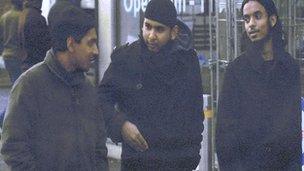
Up close and personal: Suspects under surveillance
It is not known how many people found their message attractive - but they attracted the attention of the security services. And the key period in the investigation was six weeks in the lead-up to Christmas 2010.
On 7 November that year, there was what prosecutors describe as the first group meeting, involving seven of the men. Three of the Stoke defendants drove cross-country to Cardiff to meet the men from Wales. Mohammed Chowdhury, described in court as the linchpin, took a coach from London.
The men walked together in the open in Roath Park in the Welsh capital, something that prosecutors say they did to make surveillance difficult. The talk at that meeting was to focus ideas - but also to decide on the legitimacy of violence.
The men had a question about whether Muslims could legitimately turn to violence if they were living in the West. Earlier that year, some of the world's leading Islamic scholars had made a declaration, external which dismantled, point-by-point, Osama bin Laden's claim that al-Qaeda's attacks against the West were religiously and legally justified.
It was one of a string of such religious rulings in the wake of 9/11. The men discussed its implications - and then ignored it.
They preferred the views of Anwar al-Awlaki, the now dead US-Yemeni preacher behind al-Qaeda in the Arabian Peninsula, who had been pumping out online his own English language justifications for violence.
And so, according to prosecutors, the men began working on their plans, reassured that they had religious backing to do so.
Pub toilets
The key meetings came later in November and early December, particularly when Choudhury, Shah Rahman, Miah and Desai discussed possible targets.
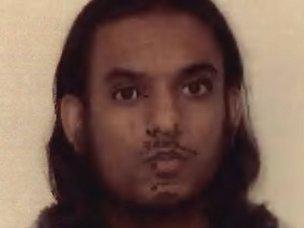
Mohammed Chowdhury was described by prosecutors as the "linchpin"
The men still had no settled plan - but the ideas included five mail bombs in the run up to Christmas, a "Mumbai-style" armed attack and targeting the London Stock Exchange. The Stoke defendants, the court heard, discussed setting pipe bombs in pub toilets.
Miah and Chowdhury thought that if they posed as stock brokers or shareholders they could casually walk into the exchange, pop to the loo and plant an incendiary device. The fire would eventually burn down the building, bringing national economic ruin one step closer.
These were obvious flaws with the plan - not least the probable role of sprinklers and the London Fire Brigade. The surveillance indicated the men wanted to plant the device on Christmas Eve. The building would have been shut.
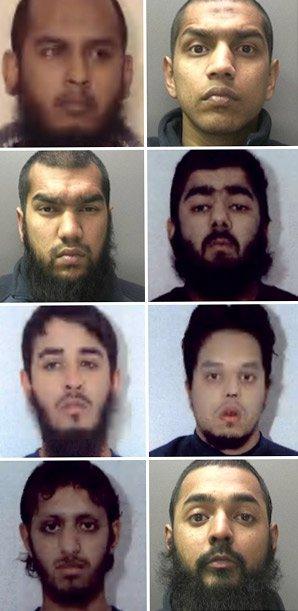
Co-defendants, left to right from top: Shah Rahman, Gurukanth Desai, Abdul Malik Miah, Usman Khan, Mohammed Shahjahan, Mohibur Rahman, Nazam Hussain and Omar Sharif Latif
Prosecuting and defence counsel told Woolwich Crown Court, following the late guilty pleas, that the wide-ranging plans were, to put it mildly, amateurish. None of them, for instance, had any idea how to get weaponry for an attack similar to the atrocities in Mumbai - and the prosecution accepted that it was never seriously considered.
The court heard that on another occasion Abdul Miah was musing about how he could raise enough cash for his plans. He considered faking car accident injuries so he could defraud insurance companies. He declared it would be: "Whiplash for the sake of Allah, innit."
But the security services were worried about the stock exchange plan because Chowdhury and Shah Rahman were later overhead going through detailed instructions for a pipe bomb.
And so, prosecutors told Woolwich Crown Court that a lack of sophistication did not equate to a lack of a threat.
Long investigation
The investigation into some of the men dates back to at least 2008. That summer, police raided homes in Stoke-on-Trent following what were described at the time as concerns raised within the community.
One of the men targeted in that operation was Mohammed Shahjahan, jailed on Thursday.
Usman Khan, Shahjahan and Nazam Hussain, apparently frustrated by Islam4UK - and its leader Anjem Choudary - decided they would do their own thing.
They wanted to get British men to a terrorism training camp in Kashmir, the court heard. This proposed camp, along with the London Stock Exchange proposal, were the only two plans that had been crystallised.
And it was this plan to run a camp, rather than focus on one single attack in the UK, that led Mr Justice Wilkie to conclude, external that these three from Stoke were "pre-eminent" and "more serious jihadis" than the others.
He said they they had a "longer-term view" and that the secretly recorded conversations showed they knew they could only successfully strike once they had obtained the skills to do so.
But before all of this surveillance led to the trial, Shahjahan appeared more openly in a religious documentary produced by the BBC about people called Mohammed.
In the interview, he was introduced as a former member of Islam4UK and he held up a sign, saying he has been deprived of his freedom of speech.
"Many people would call me a radical, a fundamentalist, maybe a terrorist," he said. "But if they say that I'm a terrorist because I'm calling for my faith, then fair enough. It doesn't mean nothing to me."
- Published9 February 2012
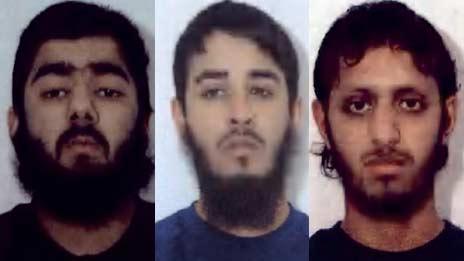
- Published8 February 2012
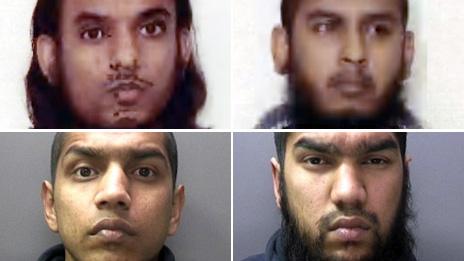
- Published1 February 2012

- Published7 February 2012

- Published6 February 2012
